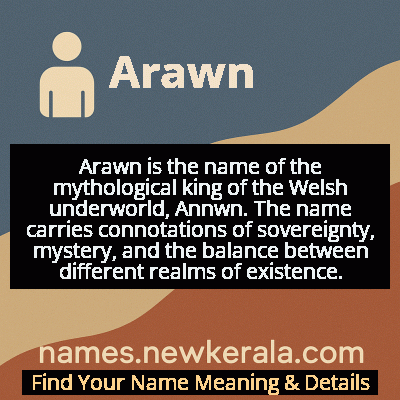Arawn Name Meaning & Details
Origin, Popularity, Numerology Analysis & Name Meaning of Arawn
Discover the origin, meaning, and cultural significance of the name ARAWN. Delve into its historical roots and explore the lasting impact it has had on communities and traditions.
Name
Arawn
Gender
Male
Origin
Celtic
Lucky Number
3
Meaning of the Name - Arawn
Arawn is the name of the mythological king of the Welsh underworld, Annwn. The name carries connotations of sovereignty, mystery, and the balance between different realms of existence.
Arawn - Complete Numerology Analysis
Your Numerology Number
Based on Pythagorean Numerology System
Ruling Planet
Jupiter
Positive Nature
Optimistic, inspirational, and creative.
Negative Traits
Scattered, exaggerating.
Lucky Colours
Yellow, gold, purple.
Lucky Days
Thursday.
Lucky Stones
Yellow sapphire.
Harmony Numbers
1, 2, 9.
Best Suited Professions
Arts, writing, communication.
What People Like About You
Creativity, optimism.
Famous People Named Arawn
Arawn (Mythological)
Mythological Figure
King of the Otherworld who forms a sacred bond with Pwyll in the Mabinogion
Arawn (Modern Author)
Writer
Modern fantasy author specializing in Celtic-inspired mythology and folklore
Arawn ap Gwyn
Historical Figure
Minor Welsh noble mentioned in historical records, possibly named after the mythological figure
Name Variations & International Equivalents
Click on blue names to explore their detailed meanings. Gray names with will be available soon.
Cultural & Historical Significance
The cultural impact of Arawn extends beyond ancient texts into modern Celtic identity and neo-pagan traditions. He represents an indigenous Welsh deity who maintained his noble characteristics despite later religious transformations in the region. The stories involving Arawn preserve important cultural values about honor, reciprocity, and the proper exercise of power. His continued presence in Welsh folklore and modern Celtic spirituality demonstrates the enduring power of these ancient narratives to shape cultural identity and provide meaningful archetypes for understanding human relationships with the sacred and the mysterious.
Extended Personality Analysis
Individuals named Arawn are often perceived as possessing deep, introspective qualities combined with natural leadership abilities. They tend to be mysterious yet principled, with a strong sense of justice and loyalty that echoes the mythological king's character. These personalities frequently demonstrate wisdom beyond their years and have a contemplative nature that draws others to seek their counsel. There's often an air of quiet authority about them, and they typically prefer to lead through example rather than command. While they may appear reserved initially, those who earn their trust discover fiercely loyal companions who value deep, meaningful relationships over superficial connections.
Their personality often includes a strong connection to tradition and history, combined with an innovative spirit that allows them to bridge old wisdom with new contexts. People named Arawn tend to be excellent problem-solvers who approach challenges with strategic thinking and emotional intelligence. They often possess a dry wit and appreciate intellectual humor, though they rarely seek the spotlight. Their strength lies in their ability to see beneath surface appearances and understand complex systems and relationships. This makes them particularly effective in roles requiring mediation, strategic planning, or creative problem-solving where multiple perspectives must be balanced and integrated.
Modern Usage & Popularity
In contemporary times, Arawn remains a rare but meaningful choice, primarily used by parents with Celtic heritage or those drawn to mythological names. The name has seen a slight increase in usage within the Celtic revival movement and among fantasy enthusiasts, though it remains outside the top 1000 names in most English-speaking countries. Its usage is most common in Wales and among diaspora communities, where it serves as a connection to cultural heritage. Modern bearers often appreciate the name's deep mythological roots and its association with wisdom and justice rather than the more negative connotations sometimes attached to underworld figures in other mythologies. The name's rarity ensures that those who bear it stand out, while its mythological background provides a rich narrative foundation for personal identity.
Symbolic & Spiritual Meanings
Arawn symbolizes the balance between life and death, the known and unknown, and the intersection of mortal and divine realms. As a mythological figure who bridges worlds, the name represents transformation, wisdom gained through experience, and the understanding that true power lies in justice and honor rather than domination. The symbolic meaning extends to concepts of sacred kingship, where rulership is not about control but about maintaining cosmic balance and order. Arawn embodies the Celtic concept of the Otherworld as a place of beauty and mystery rather than fear, making the name symbolic of hidden knowledge, spiritual depth, and the cyclical nature of existence where endings become new beginnings. This symbolism speaks to the human experience of navigating transitions and finding meaning in both light and shadow aspects of life.

